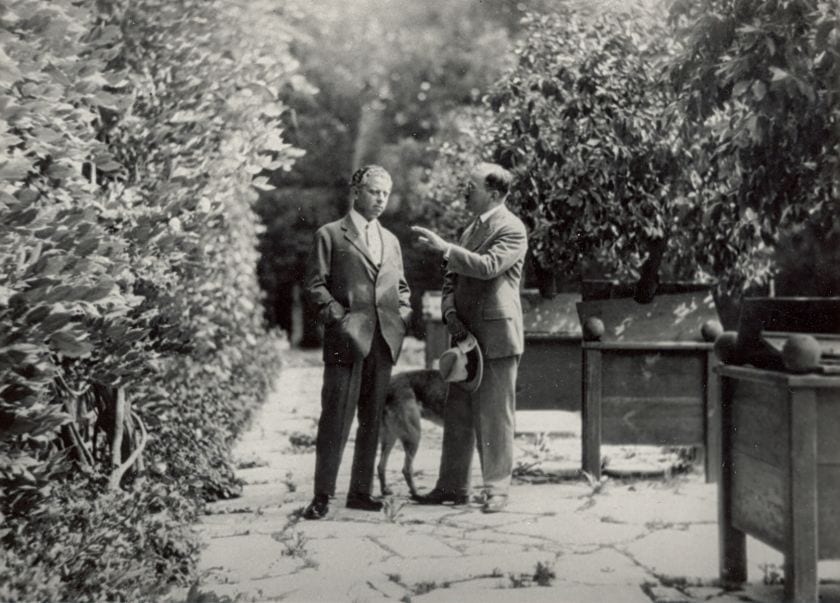The Festival is a “Creation” Every Year

This year’s Salzburg Festival honours three artists born 150 years ago.
At first glance, they are three very different personalities – and yet they are linked by a year commemorated this summer at the Salzburg Festival: Arnold Schoenberg, Karl Kraus and Hugo von Hofmannsthal. All three were born 150 years ago. The Salzburg Festival is dedicating an intense concert series to Arnold Schoenberg’s significant birthday. The fact that Karl Kraus was also born in 1874 is also reflected in the programme. Finally, the birth of one of the most influential personalities in the Festival’s history, Hugo von Hofmannsthal, 150 years ago is commemorated with a new production of Jedermann.
Beyond Dodecaphony. Strictly speaking, it’s only in September, more precisely on the 13th, that Arnold Schoenberg’s birth in Vienna has its 150th anniversary. This has inspired the Salzburg Festival to present this composer not exclusively as the creator of dodecaphony, but to offer a holistic view of him. After all, his output underwent several turning points throughout his life. Reducing him to the creator of a method of “composition using twelve tones only related to one another” would mean ignoring large parts of his very rich oeuvre, as the Salzburg Festival points out.
Thus, the series “Time with Schoenberg” features Transfigured Night (Verklärte Nacht) and the symphonic poem Pelleas und Melisande, as well as the String Quartet No. 2 with soprano. It aims to demonstrate – partially through juxtapositions – the influence Ludwig van Beethoven, Johannes Brahms, Gustav Mahler and others had on Schoenberg. On the other hand, the impulses received from him by Franz Schreker, Alban Berg, Anton Webern, Hanns Eisler are also featured – and how this influence can still be felt in the oeuvres of Luigi Nono and Olga Neuwirth.
The latter, for example, will be represented by her newly-composed score for Hans Karl Breslauer’s silent film The City Without Jews (Stadt ohne Juden), which also illustrates the political circumstances Schoenberg was confronted with. The Last Days of Mankind (Die letzten Tage der Menschheit), on the other hand, presented with Erwin Steinhauer as the narrator, create a reference to Karl Kraus. And speaking about those born in 1874 and spoken theatre, it should be pointed out that of course Hugo von Hofmannsthal’s “play of the rich man’s dying”, otherwise known as Jedermann, will be performed once again, with real and allegorical characters meeting in this morality play
Returning to “Time with Schoenberg”, however, the artists charged with bringing the composer’s melodies to life are of the highest calibre. Thus, Pelleas und Melisande will be performed by the West-Eastern Divan Orchestra under Daniel Barenboim at the Großes Festspielhaus – this concert also includes Johannes Brahms’ Concerto for Violin and Orchestra in D-major and Anne-Sophie Mutter as the soloist. Among other works, the Gustav Mahler Jugendorchester plays Schoenberg’s Five Pieces for Orchestra op. 16 under the baton of Ingo Metzmacher. The Camerata Salzburg presents Transfigured Night (Verklärte Nacht) in the version for string orchestra. The baritone Georg Nigl performs Fifteen poems from Stefan George’s Das Buch der hängenden Gärten (The Book of the Hanging Gardens) with Markus Hinterhäuser at the piano. On the same evening, the String Quartet No. 2 in F-sharp-minor for two violins, viola, cello and a soprano Op. 10 will be heard with Anna Prohaska as the soloist. Anyone wanting to hear Schoenberg himself on the considerations which led him to create twelve-tone music and his own definition of this creation will hear an interview dated 23 April 1930 recited at the beginning of this concert.
Apart from Schoenberg’s original works, the Salzburg Festival also features his arrangements, for example The Farewell (Der Abschied) from Gustav Mahler’s Das Lied von der Erde (The Song of the Earth) or the Kaiser-Walzer (Emperor Waltz) by Johann Strauß Jr.
Pierre-Laurent Aimard will dedicate himself intensely to Schoenberg’s piano music, both from the composer’s early and late period. Anyone curious about Arnold Schoenberg’s very first compositions should attend a performance of his Chamber Symphony No. 1 Op. 9. Hearing this in the arrangement for piano quintet, played by Isabelle Faust and others, means examining a turning point in the composer’s career – and the programming focus “Time with Schoenberg” will demonstrate that there were several of those throughout his life.
Theresa Steininger
Translation: Alexa Nieschlag
First published on 11.05.2024 in Die Presse Kultur Spezial: Salzburg Festival
